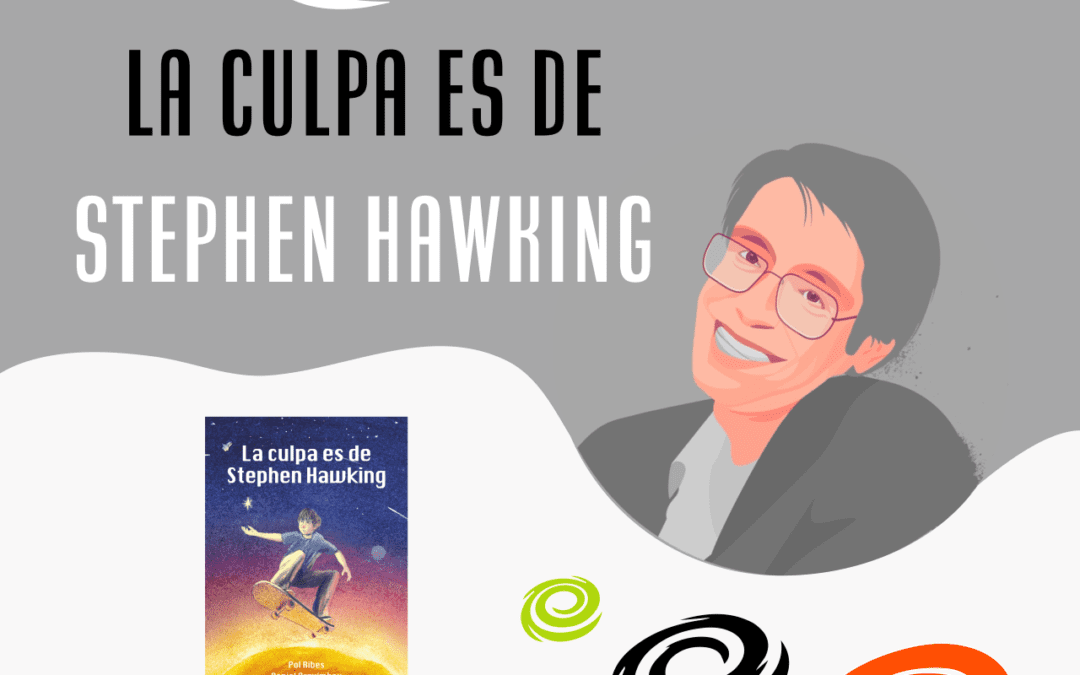Book history: “It’s Stephen Hawking’s fault” is a popular science book written by four hands that tries to arouse the interest of young preadolescents in the imminent colonization of space. The first two hands are by Daniel Arguimbau, writer and screenwriter; and the remaining two by Pol Ribes Pleguezuelo, scientist and space engineer.
The project began like so many projects among friends, between chats and laughter, and with the interest of finding a joint project with which to spend more hours together. The result was obvious. Dani had spent years writing children’s books and scripts for television and radio, while Pol worked on space missions; at the same time that the newspapers were filled more and more regularly with news about space.
During a sunny morning, and between coffees on the terrace of Dani’s apartment, he asked “Is it long before humans travel to Mars?”, to which Pol replied, “A few decades, we still have to achieve some technological challenges, but without a doubt we are going to see it ”. The conversation continued between whether they were willing not to take the risk of traveling to the red planet. Dani preferred to stay on his terrace taking care of his many many plants, while Pol, without hesitation for a second, was willing to jump through any hatch of any spaceship to be a little closer to the stars. At that time Pol was doing the tests to become an astronaut for the European Space Agency. “Then neither of us will go to Mars, but possibly the future colonizers of Mars have already been born, right?”
That context and that conversation gave rise to the project of writing the book in order to contribute the grain of sand, which maybe just maybe, could arouse the interest of a boy or girl to travel to space and become the first Spanish or Spanish to set foot on the red planet.
The book, apart from giving the reader the possibility to understand the red planet a little better (and its many similarities with Earth) through the dreams and discussions of the main character, is also a discussion between the authors about the moral fact of if we should put more emphasis on discovering new planets or if we should take care of our own first.
Synopsis of the book:Without really knowing how, Marcos is forced to do a final year project on the planet Mars. What could be a martyrdom becomes a true space adventure at the hands of his grandfather, a retired physics teacher, Laura, his physics teacher, and the stellar appearance of one of the most important scientists in history, Stephen Hawking.A novel is about to abduct you, written by four hands by a master of words and a lover of the stars, more intense than a black hole and that shows that having your feet on the ground and at the same time living in the Luna can be very fun and exciting.
The book: https://birabiroeditorial.com/es/libros/la-culpa-es-de-stephen-hawking
Can you help us to become more? Become a member and participate. Spread our word on the networks. Contact us and tell us about yourself and your project.

Pol Ribes Pleguezuelo
. Optoelectronics engineer at the European Space Agency (ESA).
Estudié física en la Universidad de Barcelona e hice mi doctorado en Optica/Opto-electronica en la Universidad Friedrich-Schiller de Jena (Alemania). He trabajado durante más de 12 años en el desarrollo de sistemas ópticos (en particular láseres) para su uso en misiones espaciales. Durante mi recorrido he vivido y trabajado en empresas en Barcelona como Monocrom, institutos de investigación en Alemania como el Fraunhofer IOF, hasta llegar a vivir actualmente en Leiden y trabajar en la Agencia Espacial Europea (ESA en inglés). Adoro Leiden y sus canales a vista de tabla de SUP, disfruto haciendo vela y descubriendo los Países Bajos en bici. A los 30 años, y en un piso con terraza de Barcelona, conocí al que iba a ser uno de mis grandes amigos y coautor de este libro, Dani.

Daniel Arguimbau
Guionista
Escribió sus primeras historias a bolígrafo, y, al final, con un ordenador. Es decir, que ha pasado más tiempo delante de un teclado que mirando el cielo. Al menos hasta que decidió aceptar la popuesta de su ‘brudi’ Pol para escribir esta historia a cuatro manos. Desde entonces, durante el día se pregunta qué hay más allá de las nubes y, por las noches, más allá de las estrellas. Confía en que la respuesta llegue de alguno de los lectores.


